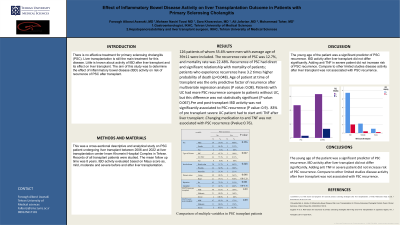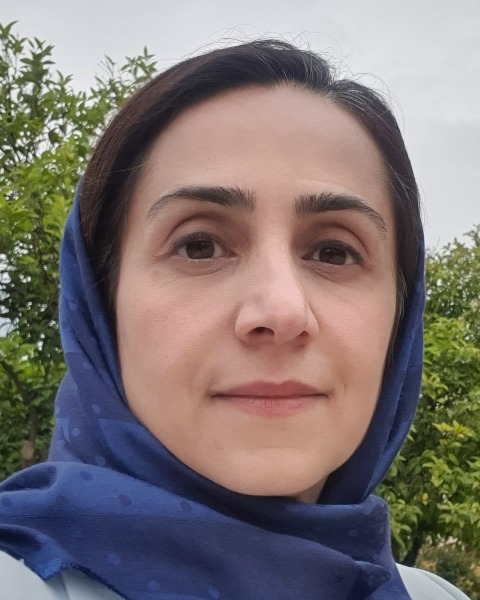Monday Poster Session
Category: Liver
P2440 - Effect of Inflammatory Bowel Disease Activity on Liver Transplantation Outcome in Patients With Primary Sclerosing Cholangitis
Monday, October 23, 2023
10:30 AM - 4:15 PM PT
Location: Exhibit Hall

Has Audio

Foroogh Alborzi Avanaki, MD
Tehran University of Medical Sciences
Tehran, Tehran, Iran
Presenting Author(s)
Foroogh Alborzi Avanaki, MD1, Sara Khosravian, MD1, Mohsen Nasiri Toosi, MD1, Ali jafarian, MD1, Najme Aletaha, MD1, Saeed Mirmoosavy, MD1, Hesam Aldin Varpaei, RN, MSc2, Mohammad Taher, MD1
1Tehran University of Medical Sciences, Tehran, Tehran, Iran; 2Michigan State University, East Lansing, MI
Introduction: There is no effective treatment for primary sclerosing cholangitis (PSC). Liver transplantation is still the main treatment for this disease. Little is known about activity of IBD after liver transplant and its effect on liver transplant. The aim of this study was to determine the effect of inflammatory bowel disease (IBD) activity on risk of recurrence of PSC after transplant.
Methods: This was a cross-sectional descriptive and analytical study on PSC patient undergoing liver transplant between 2006 and 2022 at liver transplantation center Imam Khomeini Hospital Complex in Tehran. Records of all transplant patients were studied. The mean follow up time was 8 years. IBD activity evaluated based on Mayo score as, mild, moderate and severe before and after liver transplantation.
Results: 126 patients of whom 55.6% were men with average age of 39±11 were included. The recurrence rate of PSC was 12.7%, and mortality rate was 22.48%. Recurrence of PSC had direct and significant relationship with mortality of patients; patients who experience recurrence have 3.2 times higher probability of death (p=0.048). Age of patient at time of transplant was the only predictive factor of recurrence after multivariate regression analysis (P value: 0.08). Patients with UC had more PSC recurrence compare to patients without UC, but this difference was not statistically significant (P value: 0.067).Pattern of colon involvement was not associated with rate of recurrence. Pre and post-transplant IBD activity was not significantly associated to PSC recurrence (P value: 0.9). 77% of mild UC patient did not change their medication after transplant, 69% of moderated UC patients decrease dose of their medication, but 83% of pre transplant severe UC patient had to start anti TNF after liver transplant .Changing medication to anti TNF was not associated with PSC recurrence (Pvalue:0.76).
Discussion: The young age of the patient was a significant predictor of PSC recurrence. IBD activity after liver transplant did not differ significantly. Adding anti TNF in severe patient did not increase risk of PSC recurrence. Compare to other limited studies disease activity after liver transplant was not associated with PSC recurrence.

Disclosures:
Foroogh Alborzi Avanaki, MD1, Sara Khosravian, MD1, Mohsen Nasiri Toosi, MD1, Ali jafarian, MD1, Najme Aletaha, MD1, Saeed Mirmoosavy, MD1, Hesam Aldin Varpaei, RN, MSc2, Mohammad Taher, MD1. P2440 - Effect of Inflammatory Bowel Disease Activity on Liver Transplantation Outcome in Patients With Primary Sclerosing Cholangitis, ACG 2023 Annual Scientific Meeting Abstracts. Vancouver, BC, Canada: American College of Gastroenterology.
1Tehran University of Medical Sciences, Tehran, Tehran, Iran; 2Michigan State University, East Lansing, MI
Introduction: There is no effective treatment for primary sclerosing cholangitis (PSC). Liver transplantation is still the main treatment for this disease. Little is known about activity of IBD after liver transplant and its effect on liver transplant. The aim of this study was to determine the effect of inflammatory bowel disease (IBD) activity on risk of recurrence of PSC after transplant.
Methods: This was a cross-sectional descriptive and analytical study on PSC patient undergoing liver transplant between 2006 and 2022 at liver transplantation center Imam Khomeini Hospital Complex in Tehran. Records of all transplant patients were studied. The mean follow up time was 8 years. IBD activity evaluated based on Mayo score as, mild, moderate and severe before and after liver transplantation.
Results: 126 patients of whom 55.6% were men with average age of 39±11 were included. The recurrence rate of PSC was 12.7%, and mortality rate was 22.48%. Recurrence of PSC had direct and significant relationship with mortality of patients; patients who experience recurrence have 3.2 times higher probability of death (p=0.048). Age of patient at time of transplant was the only predictive factor of recurrence after multivariate regression analysis (P value: 0.08). Patients with UC had more PSC recurrence compare to patients without UC, but this difference was not statistically significant (P value: 0.067).Pattern of colon involvement was not associated with rate of recurrence. Pre and post-transplant IBD activity was not significantly associated to PSC recurrence (P value: 0.9). 77% of mild UC patient did not change their medication after transplant, 69% of moderated UC patients decrease dose of their medication, but 83% of pre transplant severe UC patient had to start anti TNF after liver transplant .Changing medication to anti TNF was not associated with PSC recurrence (Pvalue:0.76).
Discussion: The young age of the patient was a significant predictor of PSC recurrence. IBD activity after liver transplant did not differ significantly. Adding anti TNF in severe patient did not increase risk of PSC recurrence. Compare to other limited studies disease activity after liver transplant was not associated with PSC recurrence.

Figure: Relation between Mayo score after liver transplant and PSC recurrence
Disclosures:
Foroogh Alborzi Avanaki indicated no relevant financial relationships.
Sara Khosravian indicated no relevant financial relationships.
Mohsen Nasiri Toosi indicated no relevant financial relationships.
Ali jafarian indicated no relevant financial relationships.
Najme Aletaha indicated no relevant financial relationships.
Saeed Mirmoosavy indicated no relevant financial relationships.
Hesam Aldin Varpaei indicated no relevant financial relationships.
Mohammad Taher indicated no relevant financial relationships.
Foroogh Alborzi Avanaki, MD1, Sara Khosravian, MD1, Mohsen Nasiri Toosi, MD1, Ali jafarian, MD1, Najme Aletaha, MD1, Saeed Mirmoosavy, MD1, Hesam Aldin Varpaei, RN, MSc2, Mohammad Taher, MD1. P2440 - Effect of Inflammatory Bowel Disease Activity on Liver Transplantation Outcome in Patients With Primary Sclerosing Cholangitis, ACG 2023 Annual Scientific Meeting Abstracts. Vancouver, BC, Canada: American College of Gastroenterology.
